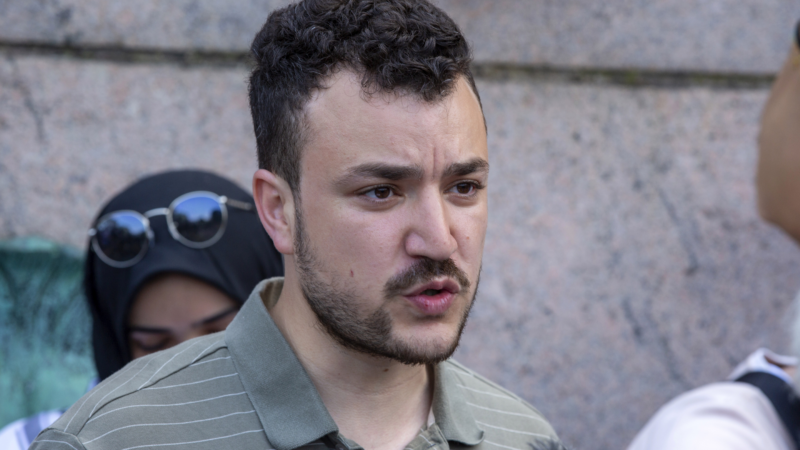Trump administration lays out its evidence for deporting activist Mahmoud Khalil
The day before activist Mahmoud Khalil was arrested by immigration authorities, Secretary of State Marco Rubio sent a two-page letter to the Department of Homeland Security accusing the Columbia University graduate student of participating in “antisemitic protests and disruptive activities.”
That letter is now at the heart of the Trump administration’s case against Khalil, according to his attorneys.
The letter, which is dated March 7, was released by Khalil’s legal team on Thursday, the day after the Trump administration submitted it in an immigration court filing. Rubio writes that Khalil’s continued presence in the U.S. would have “potentially serious adverse foreign consequences, and would compromise a compelling U.S. foreign policy interest.”
But Khalil’s lawyers say the government has provided no additional evidence to explain the basis for Rubio’s conclusion.
“Two pages. That’s it,” said Marc Van Der Hout, one of Khalil’s lawyers. “There is no there there at all.”
Lawyers for the Department of Homeland Security released their evidence against Khalil, who is a lawful permanent resident, after an immigration judge in Louisiana ordered them to do so at a hearing on Tuesday.
The Trump administration is trying to deport the 30-year-old, who played a prominent role in campus protests last year. Judge Jamee Comans said she will rule on Friday whether Khalil can be deported, or whether he must be freed. Whichever side loses is likely to appeal to the Board of Immigration Appeals.
Khalil’s case has become a crucial test for how far the Trump administration can go to deport noncitizen protesters. Khalil insists he was expressing support for Palestinians in Gaza, while administration officials accuse him of providing support to Hamas terrorism.
Khalil’s legal case is proceeding on multiple tracks. While an immigration judge considers the evidence against him, Khalid’s lawyers are also challenging his March 8 detention in federal court in New Jersey.
After ICE agents arrested Khalil on March 8 and shipped him to Louisiana, Rubio said he had revoked Khalil’s green card.
Rubio relied on a rarely used statute from the Immigration and Nationality Act of 1952 that authorizes the secretary of state to personally order the deportation of people whose presence in the U.S. the secretary believes “would have potentially serious adverse foreign policy consequences for the United States.”
But in 1990, after the Cold War ended, lawmakers modified the law to protect “beliefs, statements, or associations” that are “lawful within the United States,” and raised the standard for deportation to cases in which the foreigner’s presence in the U.S. would “compromise a compelling United States foreign policy interest.”
Khalil’s lawyers say that Rubio’s letter alone does not meet that high standard.
“His determination, quote unquote, has absolutely nothing to do with foreign policy,” Van Der Hout said during a Zoom meeting with reporters on Thursday. “What does he talk about? He talks about First Amendment activity in the United States, and the effect on people in the United States.”
Days after Khalil was arrested and detained, Homeland Security officials charged him with several additional civil violations. They allege he withheld information on his 2024 green card application, including his work history with a United Nations relief agency and his involvement with a pro-Palestinian activist group at Columbia University.
Khalil’s lawyers deny those charges. The government filed additional documents on Wednesday in support of those charges, Van Der Hout said, “but it is zero to do with the foreign policy charge. And there is zero support for the government’s allegations about any misrepresentation.”
Free speech advocates argue the administration is violating the U.S. Constitution by targeting immigrants for their activism and their political beliefs. Khalil and several other students and scholars who have been detained have challenged their arrests on constitutional grounds.
‘Bomb cyclone’ forecasted to bring heavy snow, blizzard conditions and dangerous travel
A 'bomb cyclone' is intensifying severe winter weather for millions of people across the U.S. The system is expected to knock out power and disrupt holiday travel.
Russia sends 3 Iranian satellites into orbit, report says
The report said that a Russian rocket sent the satellites on Sunday from a launchpad in eastern Russia.
Viral global TikToks: A twist on soccer, Tanzania’s Charlie Chaplin, hope in Gaza
TikToks are everywhere (well, except countries like Australia and India, where they've been banned.) We talk to the creators of some of the year's most popular reels from the Global South.
This painting is missing. Do you have it?
An important work from a rediscovered artist has been absent from public view since the 1970s. A New York curator is hunting for it.
Memory loss: As AI gobbles up chips, prices for devices may rise
Demand for memory chips currently exceeds supply and there's very little chance of that changing any time soon. More chips for AI means less available for other products such as computers and phones and that could drive up those prices too.
Brigitte Bardot, sex goddess of cinema, has died
Legendary screen siren and animal rights activist Brigitte Bardot has died at age 91. The alluring former model starred in numerous movies, often playing the highly sexualized love interest.








